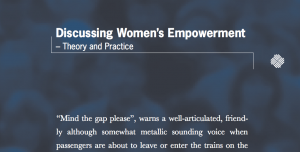‘Reflections on the measurement of women’s empowerment’ in Discussing women’s empowerment: theory and practice SIDA Studies No. 3 SIDA, Stockholm
 Series of papers on women’s empowerment that have both policy and methodological implications, presented at a SIDA workshop on ‘Power, Resources and Culture in a Gender Perspective: Towards a Dialogue Between Gender Research and Development Practice’.
Series of papers on women’s empowerment that have both policy and methodological implications, presented at a SIDA workshop on ‘Power, Resources and Culture in a Gender Perspective: Towards a Dialogue Between Gender Research and Development Practice’.
The study includes:
- a discussion of experiences in trying to implement gender policies in development and research cooperation
- a conceptualisation of empowerment and a review and evaluation of the various measures of empowerment, the values they embody and the appropriateness of these values in capturing the idea of empowerment. It is argued that prescribed processes of empowerment may violate the essence of the concept
- a discussion of how culture is a gendered practice that excludes women from sites and statuses related to power. It is argued that colonial stereotypes about Africans are perpetuated through academics in the north and that they work hand in hand with strategies to control women’s mobility in African patriarchal societies – both to prevent women’s spatial mobility and from moving into modern times. The author also asserts that customs and customary law have been used as a way to justify denial of rights to property of land for many African women
- an analysis of the use of the words ‘gender’ and ‘mainstreaming’ and how they have come to impede global solidarity/sisterhood at a time when feminist struggle is needed more than ever. The author encourages feminists from the north to listen more to feminists from the south and encourages all feminists to develop an astute critique of prevailing trends or marketisation and of the institutions that promote it
- a discussion that highlights the possibility that women may show the way to a new political culture. The author argues that women’s participation in civil society in Mexico, particularly the Zapatista women’s rebellion, implies a serious transformation in the political culture and in related gender relationships
- The final section highlights sociological and economic patterns related to religion whilst exploring the dynamics of gender in Islam. The author discusses prerogatives for change and social development in Muslim societies and suggests policies and strategies for development
[gview file=”http://www.sida.se/contentassets/51142018c739462db123fc0ad6383c4d/discussing-womens-empowerment—theory-and-practice_1626.pdf”]



